Samaaro + Your CRM: Zero Integration Fee for Annual Sign-Ups Until 30 June, 2025
- 00Days
- 00Hrs
- 00Min
Juggling spreadsheets, sending countless emails, and chasing down RSVPs can quickly drain the excitement out of planning your next event. But what if there was a way to streamline tasks, boost engagement, and generate valuable leads – all while saving you precious time? Samaaro’s event marketing automation offers a powerful solution, transforming the event from a logistical headache into a strategic opportunity for success. Before we dive into the features that make this possible, let’s understand why we need automated marketing in the first place.
Challenges of Non-Automated Event Marketing
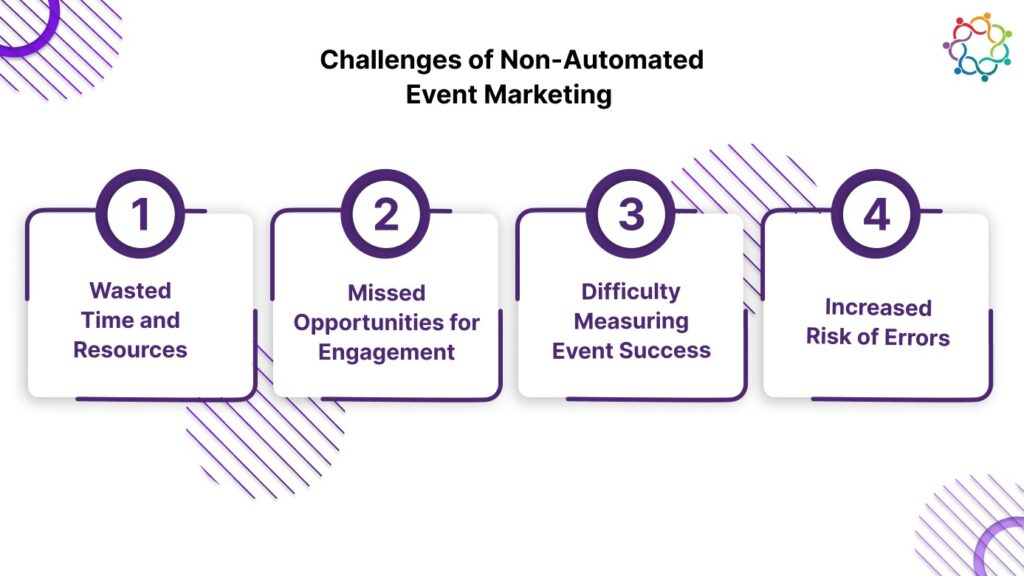
Marketing automation for events isn’t just about efficiency; it plays a critical role in gauging the success of your events. Here’s why relying solely on manual processes makes measuring results a challenging task:
Every aspect of the event lifecycle, from sending invites to managing registrations and following up with leads, is done manually. This consumes a significant amount of time and diverts resources away from strategic activities for your marketing team.
Without automation, real-time data on attendee behavior and marketing campaign performance is unavailable. The crucial step of developing valuable connections gets neglected, resulting in a negative brand experience.
Understanding the complete attendee journey is crucial for measuring the ROI of your event marketing efforts. But it becomes challenging to track the attendees’ path and quantify the event’s success without proper data and analytics.
Manual data entry and repetitive tasks are prone to errors. Typos in emails, inaccurate registration information, or missed follow-ups can hurt your professional image and impact lead nurturing efforts.
3 Ways Samaaro’s Event Marketing Automation Nurtures Leads
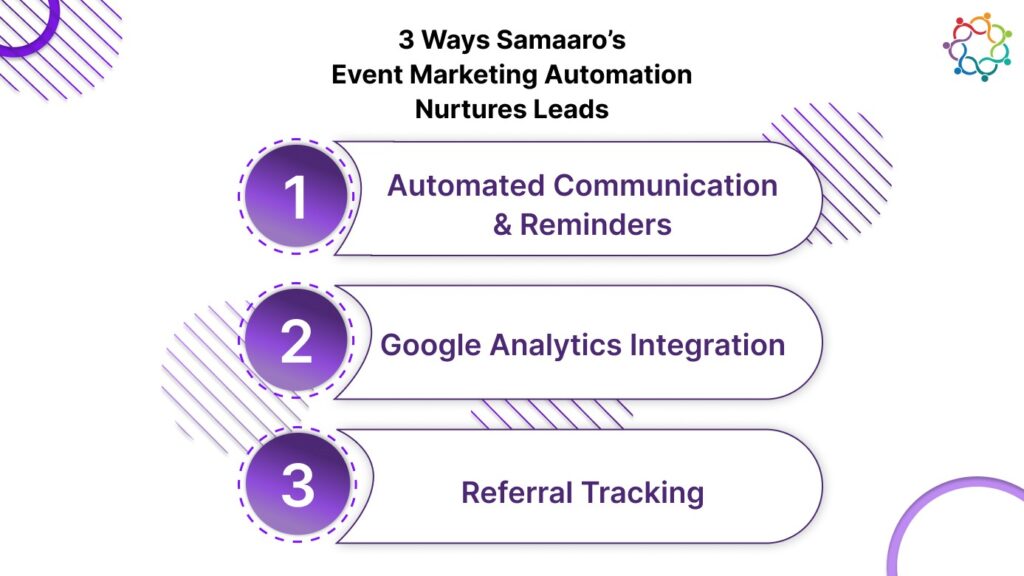
From automated emails and reminders to seamless Google Analytics integration and insightful referral tracking, Samaaro’s marketing automation for events empowers you to manage the entire event lifecycle efficiently. Read on to know more about these features:
Automated email sequences triggered from Samaaro’s registration software ensure you never miss a beat, making it easier to send targeted invitations, confirmations, and personalized thank-you messages at the perfect moments. It lets you send timely emails to keep the leads informed about important deadlines, pre-event logistics, and session details. Additionally, our RSVP solutions allow you to send automated reminders to those who haven’t RSVP’d yet, ensuring you have an accurate headcount.
Benefits–
Samaaro’s registration software doesn’t just automate tasks, it creates a more efficient and engaging environment for everyone involved. It empowers you to entice hesitating attendees to attend your event by automating strategic pre-event communication campaigns like sending valuable content and promoting the big names.
2. Google Analytics Integration:
Marketing automation also includes gaining deeper insights. Samaaro integrates with Google Analytics to provide valuable insights into your audience’s behavior and the effectiveness of your pre-event marketing efforts. It helps you track key metrics like website traffic, user behavior, and referral sources for the event registration pages or landing pages.
Benefits–
These key metrics in conjunction with the data from Samaaro’s event registration software provide a holistic view of your marketing efforts and understand which marketing channels are driving the most valuable leads.
3. Referral Tracking:
For each marketing channel, be it email campaigns or partner websites, Samaaro generates unique UTM codes. These codes are seamlessly embedded into promotional links and emails. When someone clicks on a referral link, the UTM code gets attached to their browser activity. This is how Samaaro tracks the source of the referral.
Benefits–
Referral Tracking allows you to track which channels and partners drive the most registrations, empowering you to focus your marketing efforts on high-performing sources. This data also reveals which channels generate the most qualified leads, allowing you to allocate your marketing budget strategically and strengthen valuable relationships.
Benefits of Samaaro’s Event Marketing Automation
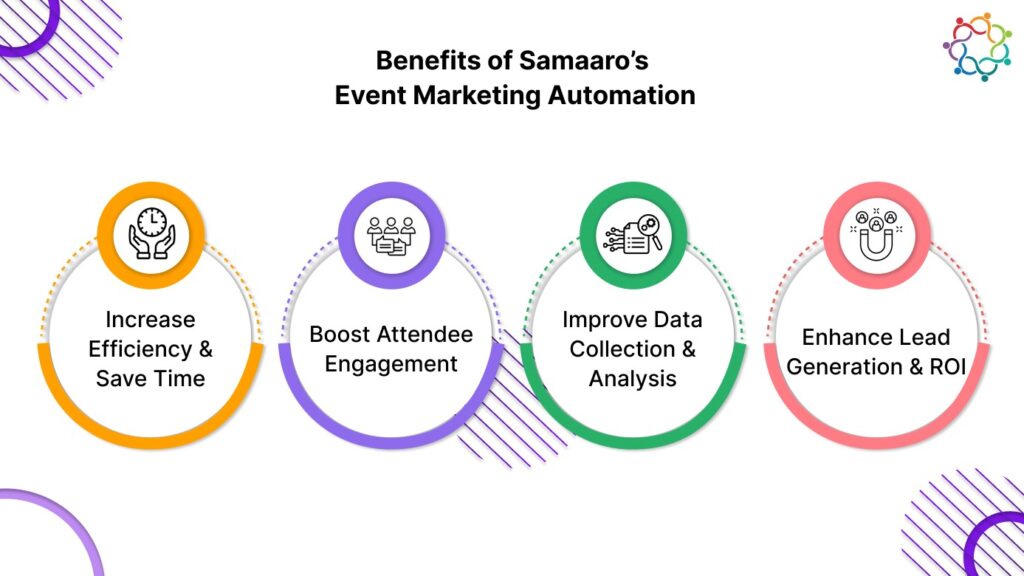
Samaaro’s marketing automation for events can unlock a treasure trove of valuable data, empowering you to move beyond guesswork and make strategic decisions based on attendee behavior. Read on to understand its benefits in detail:
Samaaro’s event registration software makes it possible to manage all aspects of the event lifecycle – from sending invitations to tracking RSVPs and generating leads – within a single, intuitive interface. More importantly, it automates repetitive tasks so your team can focus on strategic initiatives like crafting compelling content, creating personalized outreach campaigns, and analyzing data for actionable insights.
Automated email sequences allow you to keep the attendees informed before the event and generate excitement for the event experience. On receiving emails relevant to their interests, attendees are more likely to open, read, and click through to additional information. This translates to higher engagement with pre-event content and ultimately, with the event itself.
Samaaro’s integration with several tools helps you gain deeper insights into how attendees interact with your pre-event communication, the event itself, and post-event content. This knowledge allows you to optimize the attendee journey for future events.
Our registration software provides past data, helping you understand which audience demographics yielded the highest-quality leads. Use this knowledge to refine your marketing efforts and target similar profiles for future events. Leveraging our reports on engagement metrics can help you assess the quality of your leads and refine your marketing strategy, in turn maximizing your return on investment.
Conclusion
By personalizing communication, targeting high-value leads, and leveraging powerful analytics, you can unlock the true potential of your events and achieve a significant return on investment. Book a demo or start your free trial with Samaaro today and start automating your events for maximum ROI.
Managing group registrations can be a daunting task for event organizers. Traditional methods involving paper forms, manual data entry, and endless email exchanges often lead to inefficiencies, errors, and frustration. Samaaro’s registration software offers a streamlined solution, saving time and effort for both organizers and attendees.
Coordinating group registrations is a complex process fraught with obstacles. Let’s look at the common challenges faced by organizations when managing group registrations:
Dealing with paper forms and manually inputting data is time-consuming and prone to errors. This can lead to delays, inaccuracies, and a frustrating experience for the organizing staff and the participants.
Managing multiple registrations within a group often involves a flurry of emails and phone calls, making it difficult to track progress and ensure everyone is on the same page.
Without a centralized event registration system, organizers struggle to get a clear overview of group registration status, making it difficult to manage resources and anticipate needs.
Samaaro’s event registration system offers a centralized platform designed to efficiently handle group sign-ups, saving everyone involved valuable time and effort. Here’s a breakdown of its features:
A single platform for all group registrations provides a clear overview of the process. You can add or remove participants, track payment status, and communicate with the group.
Save time and effort by uploading the attendee lists directly into the event registration system. This feature is especially useful for large groups or recurring events.
Streamline the registration process with automated email notifications, payment reminders, and confirmation messages. This reduces the administrative burden on organizers and ensures the attendees stay informed.
Create tailored registration forms with specific fields relevant to your group, such as department, team, or membership information. This helps collect the necessary data efficiently.
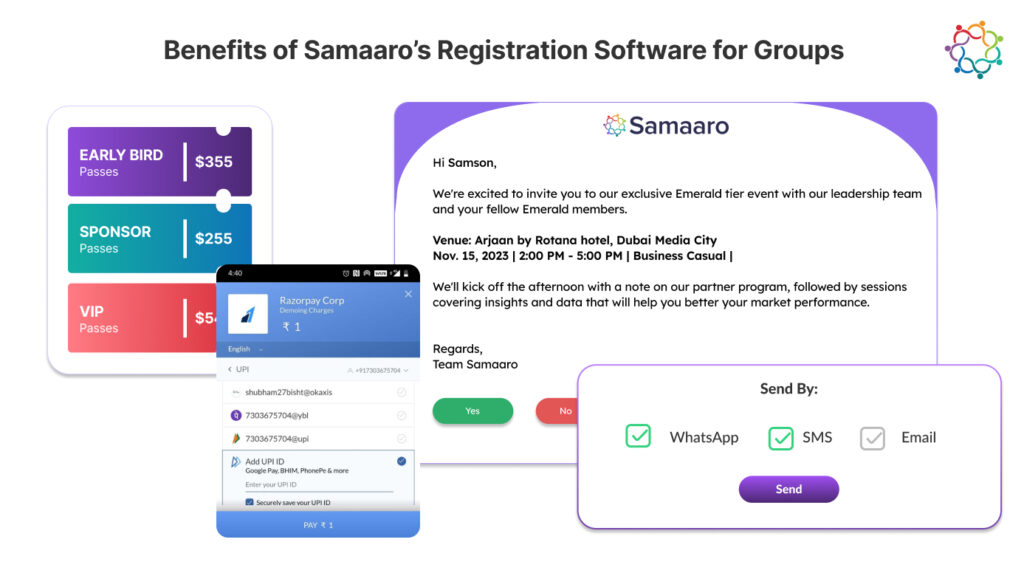
Samaaro’s group event registration software offers a multitude of benefits that extend far beyond simply managing registrations. From saving time and reducing errors to improving communication and gaining valuable insights, our platform provides numerous benefits:
By automating repetitive tasks such as data entry, email communications, and payment reminders, Samaaro significantly reduces the time spent managing group registrations. Streamlined workflows and centralized management empower you to focus on strategic initiatives and enhance the overall attendee experience rather than being bogged down by administrative tasks.
By eliminating manual data entry and implementing automated validation checks, Samaaro significantly reduces the risk of errors in attendee information. Our event registration system ensures that data is accurate, consistent, and reliable from the moment it is entered. This not only saves time but also prevents costly mistakes such as incorrect contact information or registration discrepancies. Accurate data is crucial for effective communication, event planning, and post-event analysis.
Effective communication is essential for successful group registrations. Samaaro’s centralized event registration platforms provide a clear overview of the registration process. Automated notifications for important milestones, such as payment deadlines, registration confirmations, and event reminders, ensure everyone is kept informed. This streamlined communication eliminates the need for constant email exchanges and reduces the risk of missed information, saving time and minimizing confusion for all parties involved.
Samaaro offers secure and convenient online payment options, making it easy for group members to pay their registration fees. By eliminating the need for manual payment collection, we streamline the financial process for both organizers and attendees. Our event registration software integrates with multiple payment gateways, ensuring a seamless and secure payment experience for everyone involved.
Samaaro’s platform empowers you to offer customized group discounts, tailored to corporate bookings and groups of different sizes. This strategic approach encourages group attendance, boosting overall event participation and revenue. By providing incentives for group registrations, you can attract larger groups, encourage collaboration, and create a more vibrant event atmosphere.
Access to registration data provides a wealth of information about group participation and preferences, shaping future event strategies. By analyzing registration patterns, group sizes, and payment methods, you can identify trends and optimize processes. This data-driven approach empowers you to make informed decisions about future events, including group registration policies, pricing strategies, and event offerings.
Samaaro’s group event registration software is a game-changer for organizations managing large-scale event attendance. By automating tasks, centralizing information, and providing valuable insights, we help you streamline your registration process and focus on other critical aspects of event planning. Ready to experience the difference? Begin your free trial today and discover how Samaaro can transform your group registration experience.
Conference badges are more than just ID badges; they can enhance the overall attendee experience, help reinforce brand identity, and add valuable data. Conference badge printing can be relatively simplistic, as most methods can be one-dimensional in its implementation. Samaaro’s conference badge printing software, however, allows you to create badges in a way that harnesses the full power of event badges.
While the standard duties of event badges are similar, the possibilities are limitless if we provide an in-depth series on how we can leverage them for branding, experience, and data. Let’s deviate a little from standard convention and show how we can turn event badges from a simple requirement to a powerful lever:
Reinforce Brand Identity:
Event badges reinforce brand identity by representing the conference’s theme and logo. What I mean is that when attendees look at the badges at the event, they are firmly tied to the brand and can easily remember quidproquo and identify with the logo.
Personalize Attendee Experience:
Event badges provide more than information through personalization. Meaning, if you create an event badge that customizes with names, titles, or affiliations, you create an atmosphere of recognition to make them feel like a part of the conference experience.
Collect Relevant Data:
When paired with technology, event badges become a medium through which the data can identify and quantify behavior, preferences, and session attendance to facilitate a wealth of meaningful data for future events.
Samaaro’s badge printing software will make it easy to create outstanding badges beyond the ordinary. To put into perspective how impactful it really is, we can dive into the functional components of it. That is, we can look at the design possibilities, security and printing functionality and any other integrations that help create effective event badges and take the conference experience to a different level.
Design Flexibility:
Design requirements for conference badges have never been easier. By uploading your designs or using templates provided by us, professional badges can be created for users without prohibitive costs. We provide a variety of custom options including logo uploads, creating custom badge layouts, and more personalization options, such as adding the attendee’s name, title and the logo of their organization, giving a personal feel to the badges. Custom badges that reflect your conference theme, branding and style.
Integration Capabilities:
Samaaro’s badge printing software can integrate with access control systems, to ensure safety and tracking attendance, as well as lead retrieval apps to provide opportunities for networking and data collection.
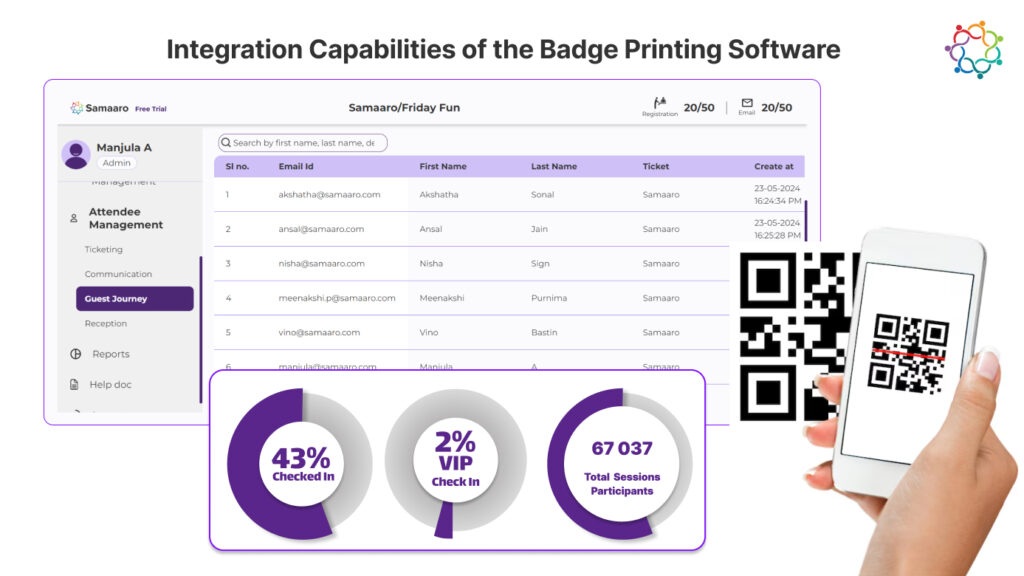
Security Features:
We take security of data, and the badges, seriously. The event badge printing software included security features such as encrypted QR codes and tamper-proof materials to protect the attendees’ data and ensure no unauthorized access.
Aside from the aesthetic and functional aspects of the visual, Samaaro’s event badge printing software has operational benefits to your conference organization to ensure overall success. Our badge printing software helps you to improve processes, security, and data collection to help you create great events. The badge printing software is beneficial in many ways to conference organizers:
Branding:
Adding personal design features to your custom event badge isn’t just a bonus; it’s an extension of your brand identity. Creating custom badges that resonate with the audience and the theme of the conference using quality materials gives individuals a lasting first impression of your conference or event. Even professionally designed and branded badge reinforces your brand image and leaves a positive lasting response by the attendees. Improve Attendee Experience:
Custom badges and clear access control lead to a positive and memorable journey for all attendees. Badges with the attendees’ names and other relevant information can elicit a sense of recognition and value. At the same time, clear access control through badge scanning reduces wait and frustration and allows the attendees to focus on networking, learning, and enjoying the event. Personalization and efficiency are great ways to improve the attendee experience.
Increase Security:
We know events require reliable data security to protect attendee information and trust. Our event management software adopts robust security practices, such as encryption, secure payment gateways, and unique ticket codes to prevent fraud and unauthorized access. Integration with the access control system ensures that only authorized people can access certain event areas and provides extra protection for both attendees and event organizers alike.
Automatically Print Badges:
With our self-service badge printing options, wait times at registration desks can be significantly reduced. With self-service, attendees are able to independently and quickly print their badge while making any relevant changes, also helping to alleviate bottlenecks created at registration desks, leading to a better overall attendee experience. The time saved at registration allows staff to focus on other tasks, such as being in charge of guest inquiries or logistical changes during the event. In addition to self-service offering, printing badges to an access control system and other event management tools also creates efficiencies and smooth workflows for events.
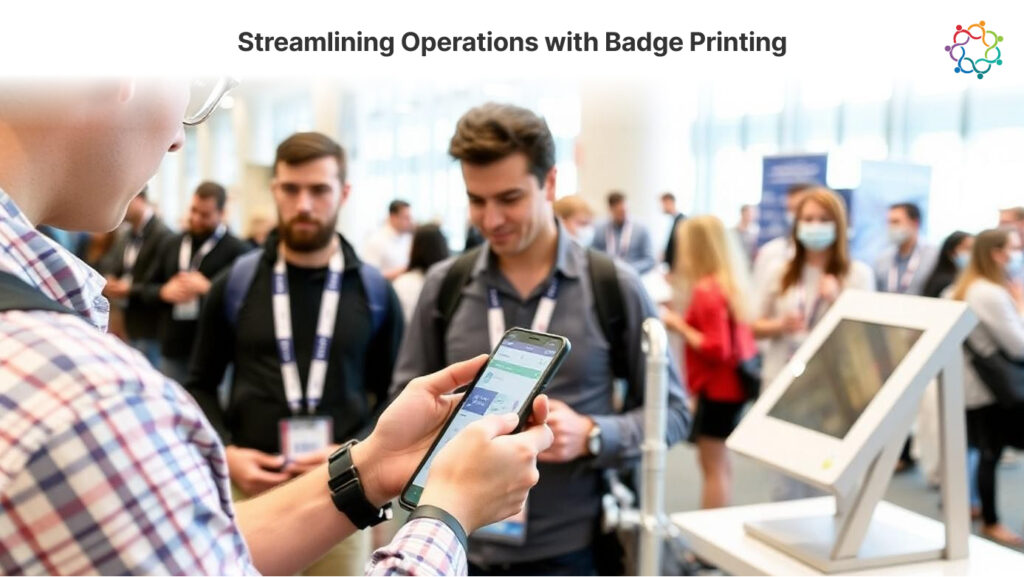
Gather Valuable Data:
By having badge data integrated with an event management software, you can find cost-effective insights for future events. The valuable and connected badge data allows you to assess your demographics of your attendees, registration trends, and which sessions were attended. These insights would allow you to find preferred changes, trends and knowledge gaps leading to more targeted marketing campaigns, efficient onsite logistics, and relevant content.
Samaaro’s conference badge printing software is much more than standard badge printing; our badge printing solution provides not only an enhancement of the attendee experience but the ability for better security practices and actionable insights. Sign up for your free trial to view how you can turn your badges into one piece of powerful infrastructure that will help transform your events.
Closed-door events, renowned for their exclusivity, often feature high-profile event speakers who command significant attention. Managing these VIP speakers requires a delicate balance of exceptional communication and personalized attention. This is where Samaaro’s event speaker management shines, offering a comprehensive solution to streamline speaker management and elevate the overall event experience.
Working with VIP speakers can be challenging. They have inflexible schedules, high expectations, and an expectation of discretion. Already, it takes a bit to manage their travel, hotel, and any expectations for onsite needs, but when it comes to the communication process you need to respect the boundaries of the speaker. You will need to establish clear communication to support you, as well as to encourage trust, and make everything run as smoothly as possible.
Samaaro’s event management platform offers a streamlined solution to simplify speaker coordination, communication, and logistics. Our comprehensive tools empower you to focus on creating exceptional experiences while ensuring seamless speaker management. We offer a suite of tools designed to simplify speaker management:
A centralized hub, built for speakers; this portal provides speakers with a comprehensive view of all things event related: schedules, logistics, presentation materials, etc. Everything is at your fingertips. By centralizing information into one platform, it reduces the hassle of having to e-mail multiple times and instead helps ease coordination and ensure presenters have all the necessary information to succeed as speakers, too.
Samaaro’s speaker coordination software facilitates seamless interaction between the organizers and speakers through real-time messaging. This enables prompt clarification of queries, discussion of presentation details, and addressing any last-minute changes. Additionally, the platform offers a centralized hub for sharing event updates, ensuring the speakers are always informed about schedules, logistics, and any modifications. This proactive approach generated a sense of transparency and trust, leading to a smoother event experience for all parties involved.
Our speaker management system allows for communication management through automation, freeing up the organizers to focus on more strategic event planning and organization. With speaker invitations, confirmations, and reminders able to be sent in advance, communication can be consistent, timely, and be free of missed deadlines and forgetting details. The overall management of speakers becomes easier and less cumbersome for the event management team.
Collect important data on speaker popularity, performance, and feedback that can be used for future events with quality speakers. The more you track competitive metrics/stats regarding speaker performance, attendee feedback, social media performance, and session attendance, the more insight you will gain regarding high-performing speakers and who engages the target audience. This knowledge and information enable you to establish partnerships with speakers, curate content to specific audiences, and improve your next experience at events.
Samaaro’s platform simplifies travel and itinerary management for speakers. By requesting their travel and stay preferences upfront, you can ensure seamless arrangements. Once bookings are confirmed, they are automatically updated in the system, providing speakers with a comprehensive travel and stay plan directly through the platform. The speakers can also easily upload their bills and expenses for quick and efficient reimbursement.
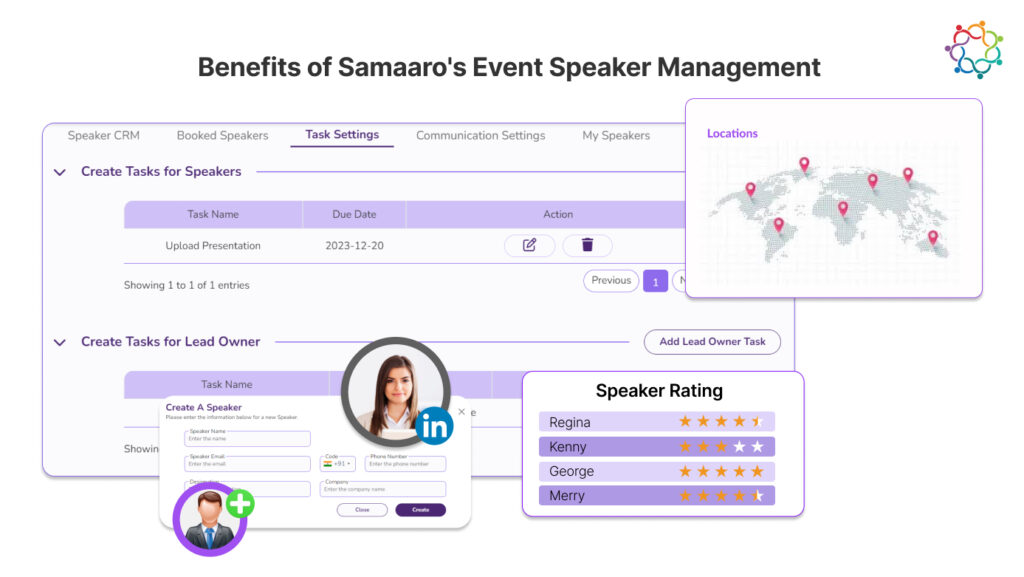
Our speaker management software offers a solution by streamlining communication, automating processes, and providing valuable insights. Leveraging this technology gives several benefits:
Build stronger relationships with your speakers through open communication and dedicated support. Samaaro’s speaker coordination software facilitates seamless interaction by providing efficient communication channels and specialized tools. This foundation allows for effective partnership building, leading to increased speaker loyalty and a higher likelihood of securing their participation in future events.
Ensure the speakers have a positive and memorable time to best develop their reputation and enhance the possibility of future collaboration and referrals. A supported speaker has a higher tendency to become an evangelist for the event and recommend the event to their colleagues, friends and family. By providing an exceptional overall service, and showing an investment in the speaker’s experience, the potential of building a long-term relationship benefits both parties.
You can use the power of data analytics to make decisions based on previously analyzed attendee data to produce successful events. For example, analysing your attendee demographics, session feedback, and speaker feedback will help identify trends, preferences, and knowledge gaps. It will then allow you to use that knowledge to select speakers, tailor content, and develop better strategies with the event logistics. A data-driven approach will help you bring your future events into closer alignment with the audience’s desires to improve engagement and satisfaction, as well as improve overall event ROI.
Samaaro’s event speaker management platform offers a comprehensive solution to the complexities of coordinating VIP speakers for closed-door events. By streamlining communication, automating tasks, and providing valuable insights, we empower you to create exceptional experiences for both the speakers and attendees. Contact Samaaro today to learn more about our platform and begin your free trial.
The event industry is undergoing a data-driven revolution. While many focus on traditional metrics like ticket sales and attendance, a goldmine of insights lies within the seemingly simple event badge. Samaaro’s badge creation software, seamlessly integrated with our comprehensive event management platform, captures valuable data that can transform how you plan and execute future events.
Samaaro’s event badge printing software goes beyond simple identification, offering tools to collect and analyze data that can inform future event planning. Let’s explore how you can leverage it:
When the attendees register for your event, they provide essential data such as name and contact information. This information is captured within Samaaro’s platform and becomes the foundation for personalized badges and targeted marketing.
Samaaro’s badge creation software seamlessly integrates with access control systems, allowing you to track the attendees’ movement throughout the event. This data offers valuable insights into session popularity, traffic flow, and event layout optimization.
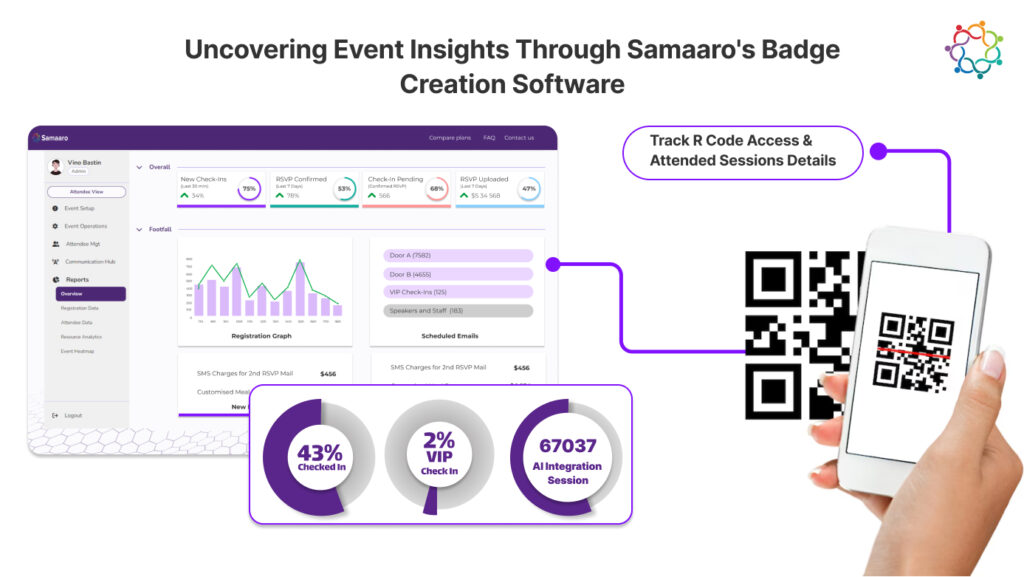
While badges serve as essential identification tools, their potential extends far beyond that. By integrating the badge printing software with comprehensive data management, a wealth of insights can be unlocked. Let’s explore how analyzing this data can transform your event planning strategy:
Analyzing attendee data lets you gain valuable insights into your audience’s demographics. Factors such as age, gender, job titles, and company affiliations paint a clear picture of your attendees. This knowledge empowers you to tailor future events to specific audience segments. The personalized approach enhances attendee satisfaction and builds stronger connections with your target market.
By integrating the badge data with access control systems, you can gain valuable insights into the sessions’ popularity. Tracking event badge scans at session entry points reveals attendance numbers and patterns. Further analyzing this data allows you to identify which sessions attracted the largest crowds and which topics generated the most interest. This information is crucial for refining future content development and speaker selection, ensuring that subsequent events offer sessions that align with attendee preferences and maximize engagement.
Harnessing the attendee data lets you forge meaningful connections and elevate networking experiences. By analyzing the attendee profiles, including professional backgrounds, interests, and affiliations, you can identify potential synergies and facilitate introductions between like-minded individuals. This data-driven approach transforms the event from a passive experience into a dynamic networking hub where the attendees can connect with relevant peers, exchange knowledge, and build lasting relationships.
Samaaro’s QR-enabled badges streamline lead generation for exhibitors and sponsors. By scanning attendee badges, exhibitors can effortlessly capture contact information, eliminating the manual process of collecting business cards and entering data. This not only saves time but also ensures data accuracy.
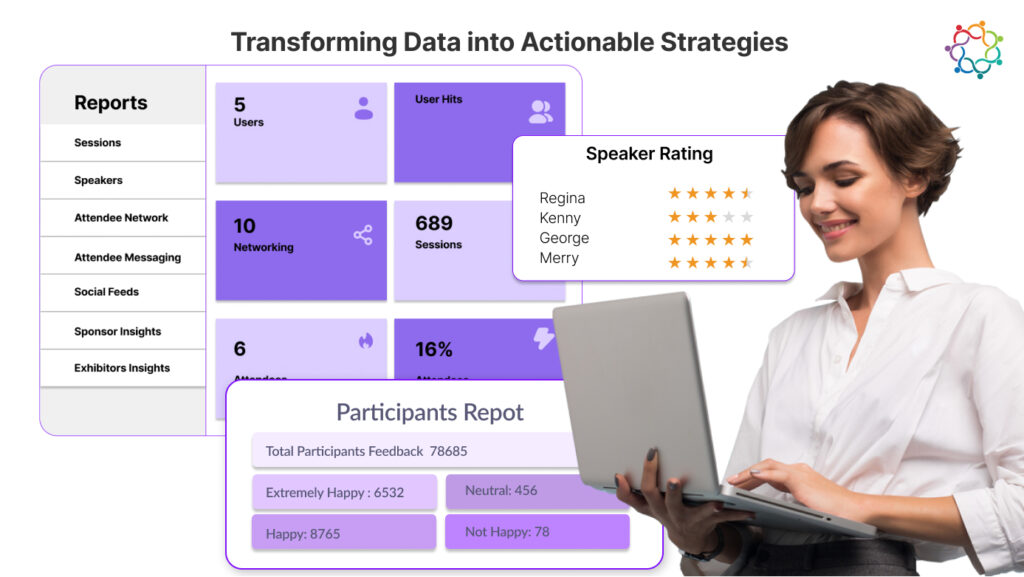
Event badge data is more than just numbers; it’s a treasure trove of insights that can significantly impact your event planning. By analyzing registration patterns, attendee demographics, and session attendance, you can transform raw data into actionable strategies:
Leverage session attendance data to identify popular topics and speaker preferences. This information helps you curate content and select speakers that align with the attendees’ interests, enhancing overall event satisfaction.
Create networking opportunities based on shared interests or professional backgrounds, as revealed in the data. This generates a sense of community and encourages deeper connections among the attendees.
Use data collected from the QR codes to measure the ROI you deliver to the sponsors. By tracking which exhibitors attract the most leads, you can optimize future events to ensure a better balance between audience and sponsor interests, maximizing benefits for all the stakeholders.
Samaaro’s badge creation software, coupled with our robust analytics platform, provides the tools you need to unlock the full potential of your event data. By harnessing these insights, you can create more engaging, impactful, and successful events. Begin your journey towards data-driven event planning by starting a free trial of Samaaro today.
The event ticketing process can make or break an event. Traditional ticketing systems often fall short, plagued by manual errors, security vulnerabilities, and limited flexibility. Samaaro’s event technology platform is designed to revolutionize this process, offering a seamless and secure ticketing experience for both organizers and attendees.
Traditional ticketing methods have long been frustrating for event organizers and attendees. From manual data entry and paper-based systems to security vulnerabilities and limited flexibility, these outdated approaches hinder efficiency and create a suboptimal experience:
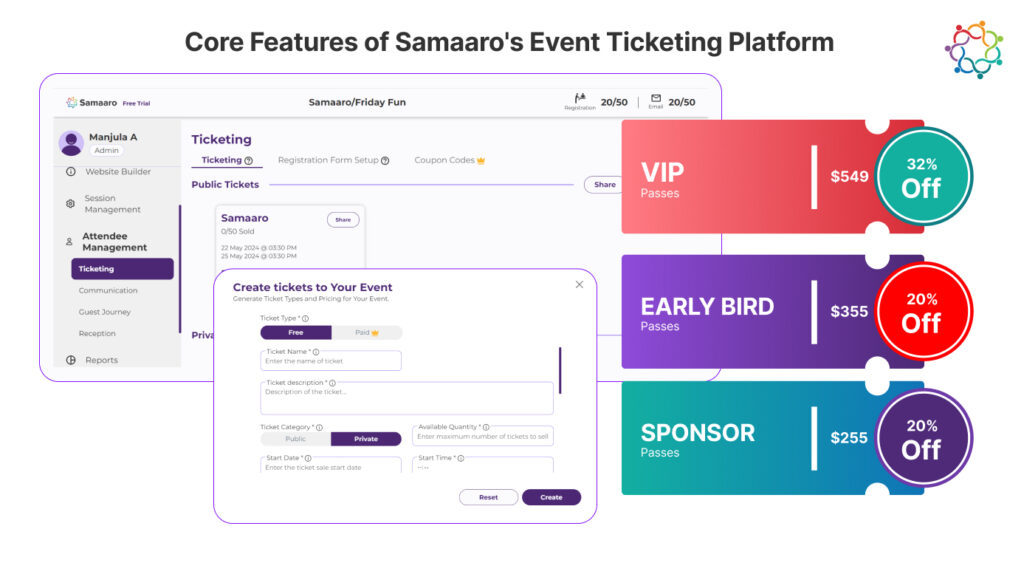
Samaaro’s ticketing platform is built on a foundation of cutting-edge technology designed to simplify the event management process. From seamless online registration and mobile event ticketing to advanced features like dynamic pricing and secure access control, our event management system offers a comprehensive solution for event organizers. Let’s explore how these features come together to create an exceptional ticketing experience:
Samaaro empowers event organizers to create professional and user-friendly online ticketing portals. Our platform allows you to clearly display event details, pricing options, and relevant information. With secure payment gateways integrated, we ensure a smooth and safe checkout process, boosting attendee confidence and maximizing ticket sales.
We offer a mobile-friendly ticketing experience, allowing the attendees to purchase, access, and share tickets directly from their smartphones. This eliminates the need for physical tickets and provides a convenient and secure option.
Samaaro empowers event organizers with a range of advanced ticketing features, including tiered pricing, early bird discounts, promo codes, and dynamic pricing. We also offer a unique ticketing solution that enables you to create a variety of tickets in multiple currencies simultaneously. These options optimize ticket sales and revenue while catering to diverse audience preferences.
With Samaaro, you gain access to advanced tracking and analytics features. Our platform provides UTM tracking to measure ticket sales performance across various channels like social media and email. Additionally, referral codes allow you to track the contributions of speakers, sales teams, and event sponsors. To further boost ticket sales, Samaaro enables you to offer a range of coupons and discount codes, including early bird, non-profit, and corporate discounts.
We prioritize security to protect both organizers and attendees. Our event management system employs robust encryption, secure payment gateways, and unique ticket codes to prevent fraud and unauthorized access. Integration with access control systems ensures that only valid tickets grant entry to the event.

Samaaro’s ticketing platform offers a multitude of benefits designed to streamline operations and drive revenue for event organizers. By automating processes, enhancing security, and providing valuable insights, our event management system empowers you to focus on delivering exceptional event experiences. Here’s a breakdown of the advantages for event organizers:
By automating time-consuming tasks like data entry and report generation, Samaaro significantly boosts the organizing team’s productivity. This streamlined approach frees up valuable resources, allowing you to focus on strategic initiatives rather than administrative burdens. The elimination of manual processes also reduces the risk of errors, ensuring accuracy and efficiency throughout the event’s lifecycle.
Samaaro empowers you to optimize ticket sales through a variety of strategies. By offering flexible pricing options, such as discounts, tiered pricing, and bundle deals, you can cater to different attendee preferences and budgets. Additionally, the event management system’s integration with multiple payment gateways ensures a seamless purchasing experience, increasing conversion rates. At the same time, leveraging promotional tools and analyzing sales data helps identify opportunities to strategically increase ticket prices while maintaining high demand.
By offering unique referral codes, you can incentivize speakers, sales teams, and sponsors to promote your event and track their contributions. Additionally, a variety of discount codes, such as early bird, non-profit, and corporate discounts, attract a wider audience and encourage early purchases. These marketing strategies, combined with Samaaro’s user-friendly ticketing platform, create a powerful tool for maximizing ticket sales while widening your event’s appeal.
Our event software provides comprehensive analytics that offer deep insights into ticket sales, attendee demographics, and purchase behavior. This data-driven approach allows you to make informed decisions for future events. By understanding ticket sales trends, identifying target audience segments, and analyzing purchase patterns, you can optimize pricing strategies, marketing campaigns, and event offerings to maximize attendance and revenue.
Samaaro’s event software employs robust measures to safeguard sensitive attendee information and prevent unauthorized access. By utilizing advanced encryption, secure payment gateways, and unique ticket codes, we minimize the risk of fraud and data breaches. Most importantly, our integration with access control systems ensures that only authorized individuals can enter specific event areas, enhancing overall security and providing peace of mind for both you and the attendees.
Samaaro is committed to staying at the forefront of ticketing technology. We continuously invest in research and development to deliver innovative solutions that meet the evolving needs of the events industry. Begin your free trial today and create exceptional ticketing experiences for your attendees.
Closed-door events are designed to create exclusive and memorable experiences for high-profile attendees. Every element of the event, from the guest list to the venue, must exude sophistication and professionalism. One often overlooked yet powerful tool to elevate these events is the humble event badge. With Samaaro’s badge printing software, you can transform custom badges into powerful branding tools, personalized experiences, and even security measures.
Closed-door events, while exclusive and prestigious, present unique logistical and security challenges. Balancing high attendee expectations, stringent security protocols, and efficient operations requires meticulous planning and execution. From managing guest lists and access control to ensuring seamless experiences, event organizers face a myriad of complexities in delivering successful closed-door events:
Closed-door events present unique challenges that require meticulous planning and execution. Catering to a high-profile audience necessitates exceeding expectations in every aspect of the event. VIP attendees demand a sophisticated and seamless experience, from the initial invitation to the final farewell.
Handling sensitive guest information, such as personal details and contact information, demands robust security measures to safeguard data privacy. A single breach can have severe consequences for both you and the attendees.
Ensuring smooth operations is paramount for the success of closed-door events. Streamlined registration, efficient check-in, and seamless access control are crucial to create a positive attendee experience. Any bottlenecks or delays can tarnish the event’s reputation and diminish the overall impact.
These complexities highlight the need for innovative solutions to manage these events effectively.
Closed-door events demand a level of sophistication and exclusivity that extends to every detail, including the seemingly simple event badge. Samaaro’s custom badge printing solutions elevate these events by offering more than just identification. From creating lasting first impressions to enhancing security and collecting valuable data, our badges are designed to leave a lasting impact on the attendees. Here’s how:
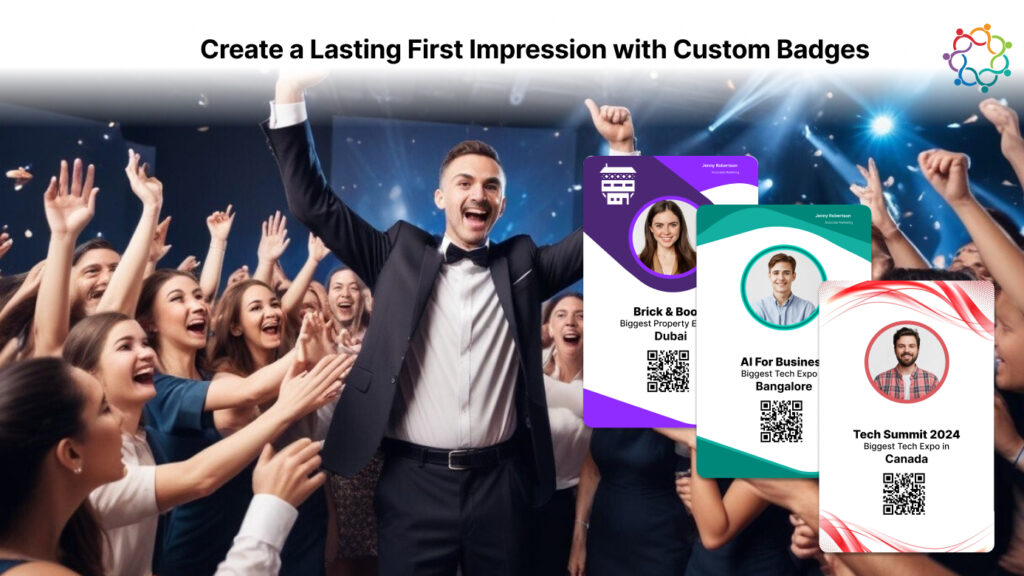
Incorporating your event’s theme and brand identity into the badge design means you create a cohesive and memorable experience from the moment attendees receive their badges. High-quality materials and printing techniques further elevate the badge’s perceived value, leaving a lasting impression of professionalism and attention to detail.
However, personalization is key to making the attendees feel valued. Including the attendees’ names, titles, and company logos on badges adds a personal touch that creates a sense of belonging. This small gesture can significantly enhance the overall attendee experience and create a positive association with your event.
Generate a sense of recognition by tailoring badges based on the attendees’ roles, interests, or affiliations. For instance, VIP attendees can be given gold-plated badges, while speakers or sponsors can have uniquely designed badges to differentiate them from general attendees.
To further enhance networking opportunities, incorporate interactive elements like QR codes into the badge design. These codes can link to attendee profiles and social media handles. This not only facilitates easy information exchange but also creates a more dynamic and engaging attendee experience.
Samaaro’s integration of badge printing with robust access control systems creates a secure and controlled environment. Each badge is encoded with unique identifiers that grant access to specific areas or sessions, preventing unauthorized entry. In fact, advanced printing technologies and encryption safeguards protect attendee information, minimizing the risk of data breaches and identity theft. This comprehensive approach to security builds a safe and trustworthy atmosphere for all the event participants.

Self-service badge printing stations can significantly reduce wait times at registration desks. The attendees can quickly and independently print their badges, freeing up staff to handle other critical tasks. This approach enhances the attendees’ satisfaction and improves overall event efficiency.
Also offering attendees the option to print badges directly from their smartphones adds an extra layer of convenience. This feature eliminates the need for the attendees to visit registration desks altogether, further streamlining the process and enhancing the overall event experience.
Samaaro’s custom badges are designed to do more than just identify attendees. They serve as multifunctional tools for enhancing networking and lead retrieval. By incorporating QR codes into badges, the attendees can effortlessly exchange contact information by simply scanning each other’s badges. This facilitates new connections and post-event follow-ups.
By leveraging Samaaro’s all-in-one event management solutions to print custom badges, you can reap significant benefits that elevate your closed-door events:
Samaaro’s software to print custom badges empowers you to transform badges from simple identification tools into powerful elements that enhance the overall event experience. By combining design flexibility, security features, and data-driven insights, you can elevate your closed-door events to new heights. Begin Samaaro’s free trial to create unforgettable experiences for your VIP attendees.
In today’s competitive event landscape, selecting the right event speakers is paramount to creating a successful and memorable event. While past experience and industry knowledge play a role, leveraging data-driven insights can significantly enhance the speaker selection process. Samaaro’s event management software provides robust analytics capabilities that empower you to make informed decisions and curate a speaker lineup that resonates with your audience.
In an increasingly competitive event landscape, data-driven decision making is essential for success. By harnessing the power of analytics, you can make informed choices that elevate the overall attendee experience.
Selecting speakers who resonate with attendee interests is paramount. By analyzing the audience demographics and preferences, you can identify topics and speakers that will captivate the audience and drive engagement.
A strong speaker lineup is a key factor in attracting attendees. By selecting speakers with a proven track record of audience engagement, you can increase the attendance rates and generate excitement about the event.
A well-curated speaker lineup contributes significantly to an event’s reputation. By choosing speakers who are experts in their fields and can deliver compelling presentations, you can position their event as a must-attend for industry professionals.
Data-driven speaker selection empowers you to make informed decisions and continuously improve future events. By analyzing speaker performance and the attendees’ feedback, you can identify trends, measure ROI, and refine your speaker selection strategy for long-term success.
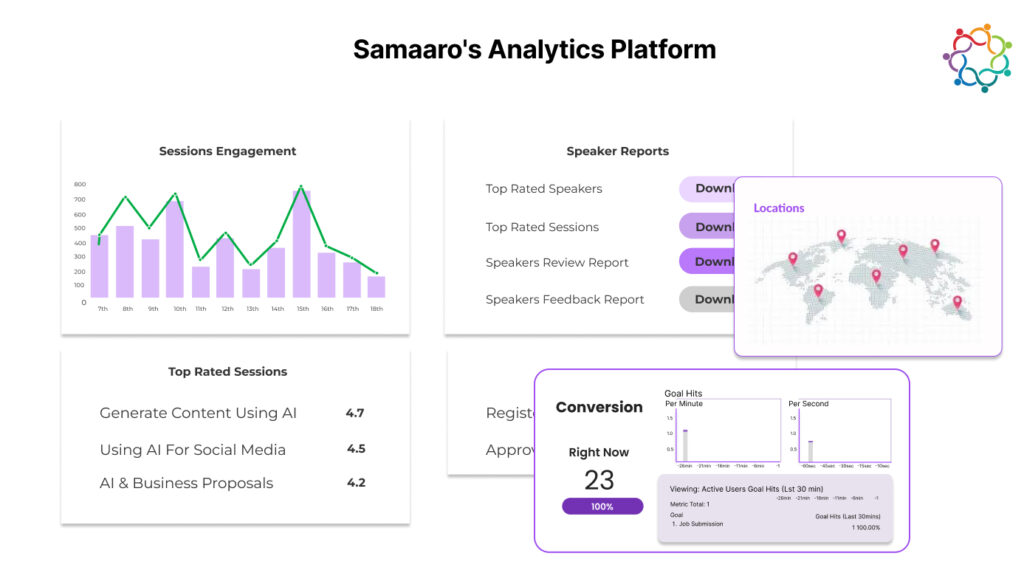
Samaaro offers a robust event management software with analytics that provides invaluable insights into the attendee behavior and event’s performance. By harnessing this data, you can make informed decisions about speaker selection and event optimization.
Analyze key metrics such as attendance, feedback scores, and engagement levels to identify high-performing sessions and topics that resonate with the audience.
Gain a deeper understanding of your attendees by examining demographic data including age, industry, job titles, and interests. This information is crucial for tailoring speaker selection to specific audience segments.
Assess the performance of past speakers based on the attendees’ feedback, social media engagement, and session attendance. Identify the speakers who consistently deliver exceptional presentations and contribute significantly to the event’s success.
Selecting the right speakers is crucial for the success of any event. While intuition and experience play a role, data-driven decision-making can significantly enhance your speaker selection process. By harnessing the power of the event management software’s features for analytics, you can identify the ideal speakers, optimize the performance, and create an unforgettable event experience. Here’s how:
By examining the session attendance, feedback scores, and engagement metrics, you can identify which sessions resonated most with your audience. In fact, high-performing sessions often share common themes or speaker characteristics. This data-driven approach helps nail down topics that garnered significant interest and identify speakers who captivated the audience. By understanding these trends, you can strategically select speakers for future events who align with your audience’s preferences and deliver similarly engaging content.
Analyzing session performance, particularly those with lower attendance or negative feedback, reveals areas where the attendees’ needs remain unmet. These insights highlight knowledge gaps that exist within the target audience. By selecting speakers who specialize in these areas, you can address these gaps directly, providing the attendees with valuable information and enhancing their overall event experience. This proactive approach ensures that future events offer a more comprehensive and informative experience for the attendees.
By analyzing attendee demographics such as age, industry, job titles, and experience levels, you can gain valuable insights into their audience. The insights empower you to tailor speaker selection to specific segments, ensuring that the content presented aligns with the attendees’ interests and knowledge levels. This personalized approach creates a stronger connection between the audience and the event.
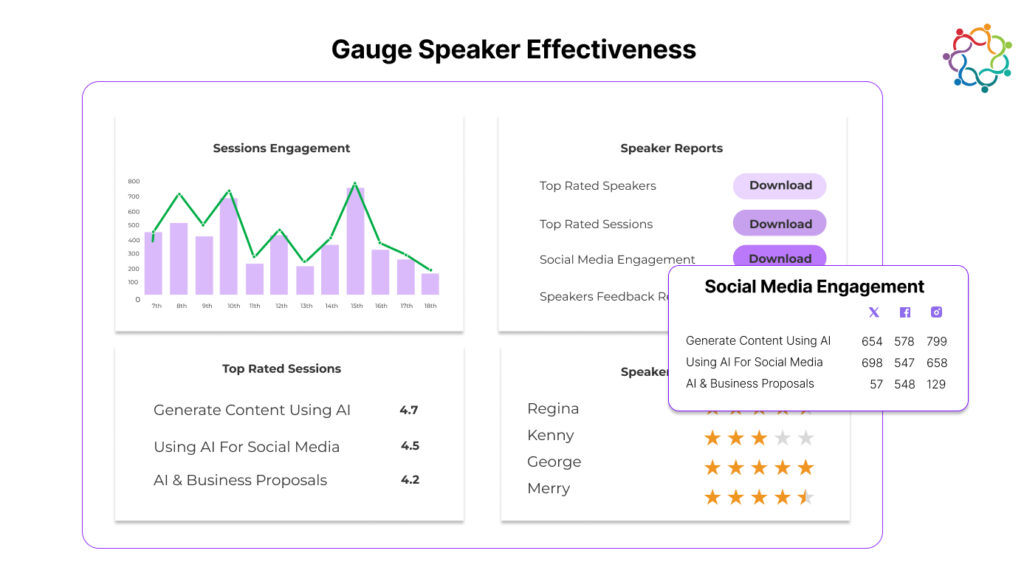
Meticulously analyzing the attendees’ feedback, social media engagement, and session attendance provides invaluable insights into speaker performance. By identifying the speakers who consistently deliver high-quality presentations that resonate with the audience, you can prioritize them for future events. This data-driven approach ensures that your speaker lineup continues to evolve and improve over time.
Identify and cultivate your top-performing speakers based on data-driven insights. By analyzing the performance metrics, pinpoint those who have consistently captivated audiences. Subsequently, tailor your pre-event promotional strategies to emphasize the speakers’ expertise and past successes, generating anticipation and engagement.
Furthermore, build a collaborative relationship with these speakers to refine their content and align it with the audience’s preferences and feedback, ensuring ongoing relevance and impact. Finally, extend speaker engagement beyond the stage by creating opportunities for interaction, such as pre-event Q&As or post-event meet-and-greets. This holistic approach not only enhances the attendees’ experience but also drives stronger connections between the speakers and audience.
Samaaro’s analytics empower you to make informed decisions that resonate with your audience. By delving into the attendees’ preferences, analyzing past performance, and evaluating the event speakers’ effectiveness, you can curate a speaker roster that captivates and inspires. Begin your free trial and unleash the full potential of your events.
Positive impressions are crucial, especially at events. Long wait times and tedious registration processes can set a negative tone for the attendees from the moment they arrive. In today’s fast-paced world, event planners need efficient event registration solutions that prioritize the attendee experience. Samaaro’s event technology platform addresses this challenge by offering a suite of features designed to streamline the registration process, with QR codes playing a key role in this strategy.
Let’s explore the limitations of traditional registration methods and discover how they often fall short of creating a smooth and efficient experience:
The reliance on manual data entry is a time-consuming and error-prone process. Filling out paper forms creates bottlenecks and delays, frustrating the attendees and event staff alike.
Endless queues with cumbersome paper forms are a recipe for attendee dissatisfaction. These methods lack scalability and struggle to handle large events effectively.
Traditional methods offer minimal data collection capabilities. Valuable information about the attendees’ arrival times and early engagement is often lost.
Samaaro empowers you with a smarter way to handle registration through QR codes. Here’s how it works:
The attendees register seamlessly through Samaaro’s event registration software. Upon successful registration, a unique QR code is automatically generated and sent to each attendee via email or mobile app.
The arriving attendees simply scan their personalized QR code at designated registration kiosks using their smartphones. The code retrieves their pre-registered information, eliminating the need for manual data entry and facilitating a swift registration process.

Samaaro’s QR codes are a multi-functional tool that goes beyond the initial check-in. They unlock a range of features that enhance the event experience from access control to lead retrieval. Let’s explore how these versatile QR codes elevate your event beyond ticketing and registration:
QR codes can be linked to the event management software to grant access control systems. Upon scanning, the code verifies the attendees’ permissions and grants access to specific event areas or sessions, ensuring a secure and efficient entry process.
The attendees can leverage QR codes for simplified networking. By scanning each other’s codes, the attendees can instantly exchange contact information, eliminating the need for cumbersome business card exchanges.
With QR code scanning, exhibitors can effortlessly collect the attendees’ information and build stronger relationships with high-quality leads through personalized follow-up.
By automating event registration and providing valuable data insights, Samaaro’s QR code solutions offer significant benefits:
Faster registration translates to shorter queues and a smoother overall event flow. The attendees can dedicate less time waiting and more time enjoying the event experiences.
Eliminating manual data entry minimizes errors and ensures accurate attendee information. This translates to better communication and data analysis for organizers.
QR code scans feed the event registration software with valuable data on the attendees’ arrival times, session participation, and booth visits. This data empowers you to understand the attendees’ behavior and optimize future events.
Streamlined registration reduces the need for a large manual registration staff. This allows you to allocate resources more effectively towards other aspects of the event.
By incorporating Samaaro’s QR code solutions, you can streamline registration, improve data accuracy, gain valuable insights, and set the stage for a successful and well-received event. Begin your free trial with Samaaro and embrace the future of innovative QR code-based event registration.
Today’s attendees expect a more comprehensive experience, and event badges can now be powerful tools that enhance security, personalize interaction, and provide valuable data. Integrating badge printing with access control and data management systems unlocks these possibilities, creating a seamless and data-driven event experience.
Traditional, standalone badge printing methods struggle to meet the evolving needs of the attendees- mainly a more dynamic and personalized experience. This is where integrated badge printing offers a range of benefits:
The badges become multi-purpose tools. They not only grant access based on the QR code, but also enable the attendees to connect with each other, and facilitate lead generation.
The unique QR codes included in each badge ensure only authorized individuals gain entry to designated areas or sessions.
An event badge can be customized with the attendees’ names, contact numbers, and your organization’s logo for a more personalized experience.
By encoding badge printing software with access permissions and utilizing strategically placed readers, Samaaro ensures a secure and efficient entry process, while also gathering valuable data to optimize future events. Here’s a closer look:
Printed badges contain unique QR codes. These codes are generated during registration and link to the attendees’ access level or session permissions.
The event badge readers strategically placed at entry points scan these codes. Based on the encoded information, the system grants or denies access, ensuring only authorized individuals enter specific areas.
Access control systems generate real-time data logs. This allows you to track the attendees’ movement throughout the event, identify areas with high traffic, and make staffing adjustments as needed.

In the age of data-driven experiences, event badges are no longer just a way to identify the attendees. By integrating badge printing software with data management, this simple tool transforms into powerful resources. This innovative pairing provides post-event analytics for understanding the attendees’ behavior:
Access control data reveals the attendee movement patterns throughout the event. This helps identify areas with high traffic and bottlenecks, informing future venue layout and logistical decisions.
By analyzing badge scans at sessions, you can understand which sessions were the most popular and how long the attendees stayed engaged. This allows you to refine content and speaker selection for future events.
Data on the attendees’ interactions through badge taps at exhibitor booths or networking events helps identify potential leads and understand the attendees’ networking patterns.
Juggling security, attendee experience, and insightful data collection can be a challenge. However, there’s a solution that offers a win-win on all fronts. Integrated badge printing software offers a range of advantages:
Integrated systems and advanced printing techniques significantly reduce the risk of unauthorized access, ensuring a safe and secure environment for all the attendees.
Automated access control simplifies entry processes, eliminates manual verification needs, and reduces queueing times. Imagine the attendees seamlessly entering sessions with just a tap of their badge.
Event badge data provides valuable insights into the attendee behavior, session attendance patterns, and areas of interest. This allows organizers to tailor future events to meet attendee preferences and maximize engagement.
Personalized badges add a touch of your brand, while efficient access control creates a smooth and stress-free experience for the attendees.
In a data-driven world, embracing innovative technology like Samaaro’s integrated event badges is key to creating a successful event. With improved security, streamlined operations, and valuable attendee insights, this technology holds the potential to transform the event experience for both organizers and attendees. Begin Samaaro’s free trial and create truly unforgettable events.

Built for modern marketing teams, Samaaro’s AI-powered event-tech platform helps you run events more efficiently, reduce manual work, engage attendees, capture qualified leads and gain real-time visibility into your events’ performance.
Location
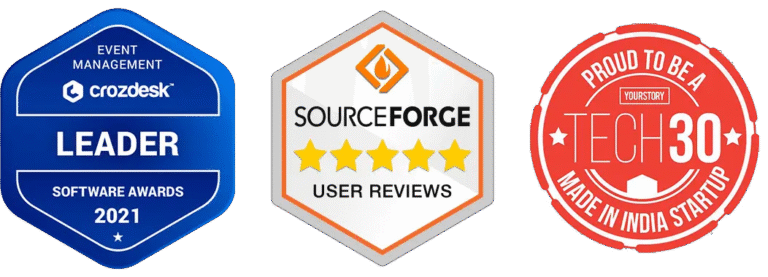
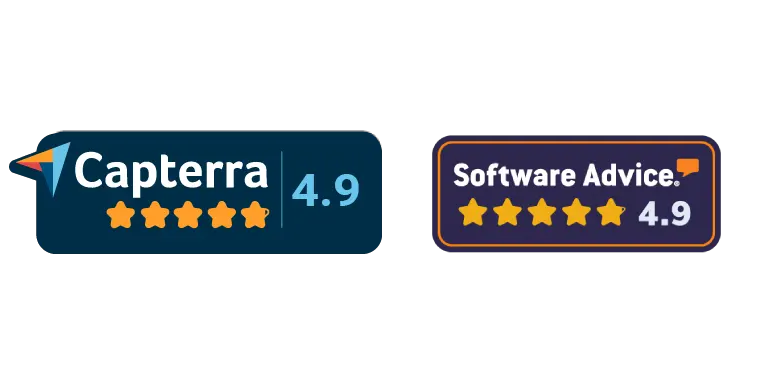
© 2026 — Samaaro. All Rights Reserved.